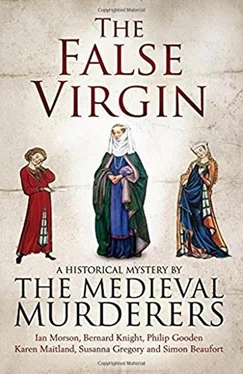He stood there for some time, squinting at the unfamiliar script and scratching his head. He did not know much of the language but he knew enough to obtain a general sense of what the document contained. It appeared to be about the purchase of some plot of land, not land in England but in Castile. The thing was in Spanish.
Despite its size the audience chamber was full, or so it seemed to Geoffrey Chaucer. He glanced round, dazzled by the wealth of candles on display, candles whose beams were intensified by their reflection in so many mirrored and plated surfaces. The candles were a sign of splendour and abundance, and scarcely needed since the evening was fine with sufficient light still coming through the ample windows to read by.
Geoffrey was standing at a lectern, ready to recite the story of St Beornwyn. Directly in front of him, seated on a great chair, which was almost a throne, and under a canopied dais, was John of Gaunt. At a discreet distance from the Duke of Lancaster were seated Katherine Swynford and other ladies of the household, including Philippa Chaucer. Further back in the room were yet more ladies, with a scattering of gentlemen as well. Chaucer had been surprised to recognise a couple of them. One was Sir Edward Jupe, the lanky knight from the Tabard Inn. He greeted Geoffrey warmly, saying that he thought he recognised his name on their first encounter but had not realised he was addressing the illustrious poet or ‘maker’, as he put it. Standing to one side was a demure-looking lady who glanced repeatedly at Sir Edward, as he did at her. Chaucer assumed she was the one he had been racing to see, wearing his rust-patterned tunic and all. He was better dressed now, though in a style befitting a knight who has neither the time nor the resources to waste on the latest fashion.
Thomas Banks was also in attendance, an unusual honour for a mere steward, but it confirmed that his place in the Lancaster household was more important than it appeared. A greater surprise was to see the handsome Spanish man, the Castilian, whom Chaucer had glimpsed in company with his wife. He asked Philippa who he was, pretending that it was an idle query and claiming that he had glimpsed the gentleman round the Palace. Was it his imagination or did Philippa look uneasy? She told her husband that this individual was called – and here she paused as if struggling to recall his name – Carlos de Flores and that he was part of the retinue of Queen Constance. Something in Philippa’s hesitation wasn’t convincing. As for Queen Constance of Castile, she was not in the audience chamber, of course. Indeed, she only kept company with her husband on public occasions, and not always then. There were other Castilians in the room, including a round-faced priest with a prominent pectoral cross.
Geoffrey regarded these individuals with some suspicion. He’d come to the conclusion that the thieving visitor to his lodgings must have been someone connected to Constance. It was obvious, really. Knowledge of the Beornwyn poem was restricted to the Savoy, where almost anyone on the English side might have been able to have a sight of it since he had already dispatched two copies there. But the nest of Castilians in the palace might not have been aware of this. If they wanted to read about Beornwyn, for reasons Geoffrey couldn’t yet fathom, then the only way would have been to go to the source himself, or rather to Aldgate. More conclusive evidence of a Castilian visitor was that the legal document was in Spanish (it was indeed about the transfer of a parcel of land). Geoffrey’s belief was that the caller had simply snatched up the scroll at random to impress whoever he found in Aldgate. The red seal with the device of the three-turreted castle signified the house of Castile. When Geoffrey talked more about the robbery to Joan and Thomas he discovered that mother and son had not detected any foreign accent but, to them, he was a gentleman and all gentlemen talked differently – or oddly.
John of Gaunt cleared his throat as a sign that Geoffrey might begin. The gentle conversations in the chamber died away. Geoffrey glanced down at the sheets before him, the version of the saint’s life written out in his own hand. He started to recite, working half from memory, half from the words before him.
‘God grant that all our dreams are fair,
For certain in this life is care
Enough without there be more strife
From sleep than in our waking life.’
After a while he realised that he was not receiving the response he expected. Quiet attentiveness, yes, but with an undertone of coldness, even disapproval. Some of the court ladies glanced at each other. When Chaucer came to the part of the story, the dream sequence, speculating that Beornwyn might not have been a pure maid after all but a woman like any other, the glances became more frequent and there was even the odd bout of muttering. All at once he understood what he should have understood before: that a saint’s life, however remote and unlikely in its details, was nevertheless a kind of sacred object, not to be tampered with. He realised too that although he had sent copies to the Savoy it seemed as though no one had looked very carefully at the poem.
It was fortunate he concluded the poem by stressing Beornwyn’s purity, and dwelling on her butterfly cloak and other miracles. Even so, the applause at the end, led by John of Gaunt, was muted. The only individual to compliment him was – and this was most odd – the round-faced priest with the cross, whose name was Luis. He had a large, fleshy hand, which he offered like a lump of meat, the fingers weighted with rings, Geoffrey noticed.
‘Master Chaucer,’ he said, although he had difficulty getting his tongue round the name, ‘your fame is spread far and wide. Now with this romance of your saint from the north, her fame is spreading too. But you do not think she was such a saint, eh?’
Geoffrey gave some bland answer to the effect that it was a story, and so something half true, half invented. He was starting to regret ever having heard of Beornwyn, although he did not say this.
But Geoffrey’s regrets on this evening in the audience chamber of the Savoy were as nothing to his regrets a day later when the news reached him that a man had been found dead on the Thames foreshore and that, tucked away inside the corpse’s tunic, was a copy of his very own work.
It was the morning after the discovery of the body on the foreshore. Once again, Geoffrey was at the Savoy, although not in the light and luxury of the audience chamber or in the comfort of his wife’s quarters. Instead he was sitting in a chilly, cramped office that had been put at his disposal. He couldn’t help feeling that the meagre quality of the room was an implicit rebuke or even a warning. Geoffrey was out of favour with John of Gaunt, and this was a bad position to be in.
It was not only that Chaucer had written and recited a poem that was coldly received by its listeners on account of its disrespectful, even irreverent treatment of a saint who – for God’s sake! – Gaunt had not even heard of until a couple of months ago. It was more than the fact that a member of the retinue of Queen Constance had been discovered dead by the river. Worse still, from Geoffrey’s point of view, was the copy of the Beornwyn poem that had been found on the body of Carlos de Flores. It seemed as though he was somehow being held responsible for de Flores’s death, at least in part. As far as the riverside corpse was concerned, the story was being put about that he had drowned. But the truth, that he’d sustained a vicious attack, was also starting to circulate, despite the best efforts of Thomas Banks to prevent it getting out. Furthermore, the fatal injuries had probably been made with a knife. It was not known whether these rumours had yet reached the ears of Constance but they surely would.
Читать дальше












